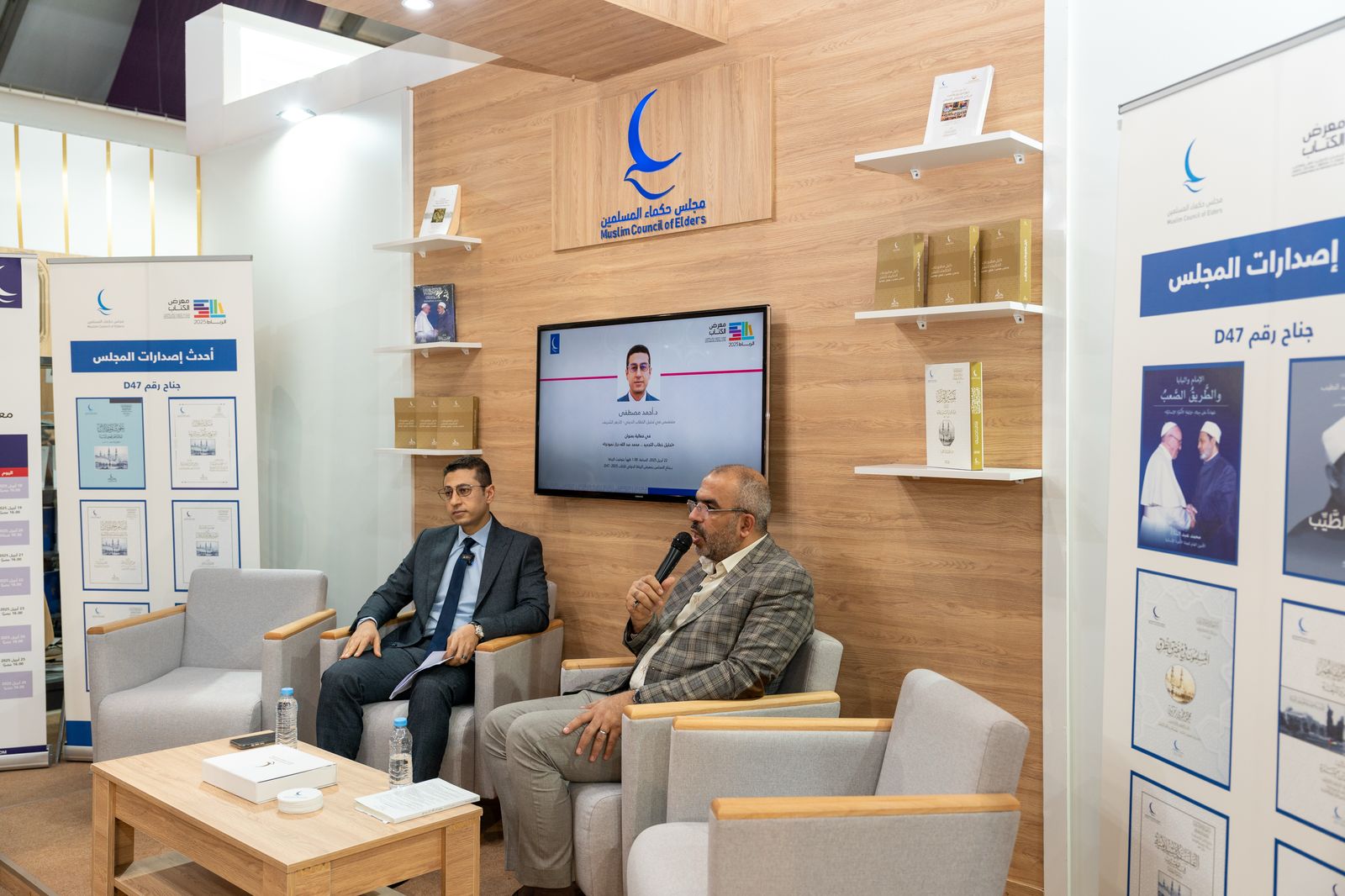"Renewing Religious Discourse" — Seminar at the Muslim Council of Elders' Pavilion at the Rabat International Book Fair
Dr. Samir Boudinar: Renewing religious discourse is a matter of urgent relevance in today’s global context
Dr. Ahmed Mostafa: Muhammad Abdullah Draz represents a continuation of the Azharite tradition of revival and renewal—blending Islamic heritage with the insights of modern Western thought
As part of its cultural program at the 30th Rabat International Book Fair, the Muslim Council of Elders hosted a seminar titled “Analyzing the Discourse of Renewal: Muhammad Abdullah Draz as a Model.” The seminar was moderated by Dr. Samir Boudinar, Director of the Al Hokama Center for Peace Research, and presented by Dr. Ahmed Mostafa, a specialist in religious discourse analysis at Al-Azhar.
In his opening remarks, Dr. Boudinar emphasized that renewing religious discourse is a matter of pressing importance in the contemporary world, given the urgent need to develop scholarly and methodological tools of expression. He noted that Dr. Muhammad Abdullah Draz stands out as one of the leading figures in the renewal of religious thought in modern times.
For his part, Dr. Ahmed Mostafa stated that Sheikh Dr. Muhammad Abdullah Draz represents a continuation of a prominent intellectual current within Al-Azhar—namely, the “revival and renewal movement,” which emerged in the modern era with figures such as Sheikh Muhammad Abduh, Sheikh Hassan Al-Attar, and other distinguished scholars of Al-Azhar. These scholars combined a deep, comprehensive understanding of the rich and diverse Islamic heritage, with all its complex issues and profound intellectual insights, with a constructive engagement with modern Western methodologies. They built upon these methods in a way that served the interests of the Arab and Islamic worlds and addressed the pressing challenges they continue to face.
He added that Sheikh Muhammad Abdullah Draz had a unique relationship with the Qur’an. His writings and intellectual contributions reflected his bold engagement with the text, using logic and rational analysis to explore its meanings and speak directly to the modern mind. His treatment of the Qur’an’s miraculous nature was both creative and comprehensive—going beyond its linguistic and rhetorical brilliance to include psychological, intellectual, moral, historical, reformative, and ethical dimensions. He possessed a sharp renewalist vision, which earned him wide recognition among scholars and intellectuals as one of the most influential figures in modern Islamic thought.
Dr. Ahmed Mostafa further explained that Sheikh Draz approached the question of the Qur’an’s divine origin through a method uniquely suited to the modern era, particularly in the face of the doubts and suspicions raised by materialist and deviant ideologies. His approach combined rational and spiritual analysis, focusing on the internal structure of the Qur’an—its coherence, objectivity, and unity of message. With remarkable clarity, he distinguished between the Qur’anic revelation and the Prophet’s own speech in both style and substance, showing that the Qur’an is not the word of the Prophet Muhammad (peace be upon him), but a divine revelation in both origin and nature. This sacred text, Draz demonstrated, surpasses the Prophet’s own words in eloquence, legal depth, and psychological insight. Sheikh Draz’s methodology skillfully bridged the authenticity of Islamic intellectual tradition with the demands of the modern age, making his perspective both distinctive and persuasive, not only for Muslim scholars and thinkers but also for non-Muslims seeking to understand the depth of the Qur’anic message.
The Muslim Council of Elders’ Pavilion at the Rabat International Book Fair showcases over 250 diverse intellectual and cultural publications, including a number of its latest 2025 releases from Al-Hokama Publishing, addressing key contemporary intellectual and cultural issues. The Pavilion also hosts a series of cultural and scholarly events featuring prominent scholars, thinkers, authors, academics, and university professors, all in line with the Council’s vision and mission to promote peace and uphold the values of dialogue, tolerance, and human coexistence. The Council’s Pavilion is located in the Souissi District of Morocco’s capital, Rabat, at Stand D47.

